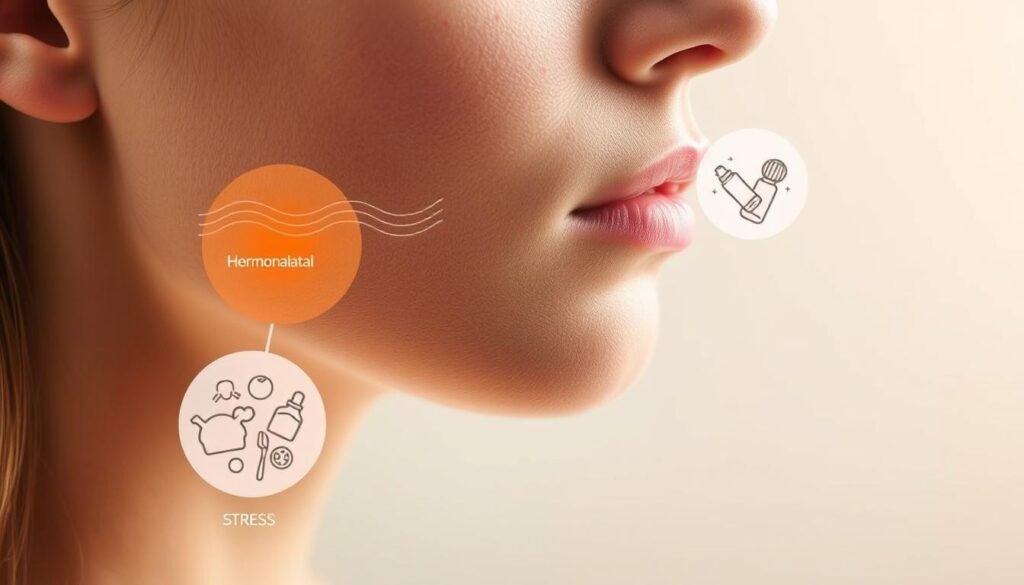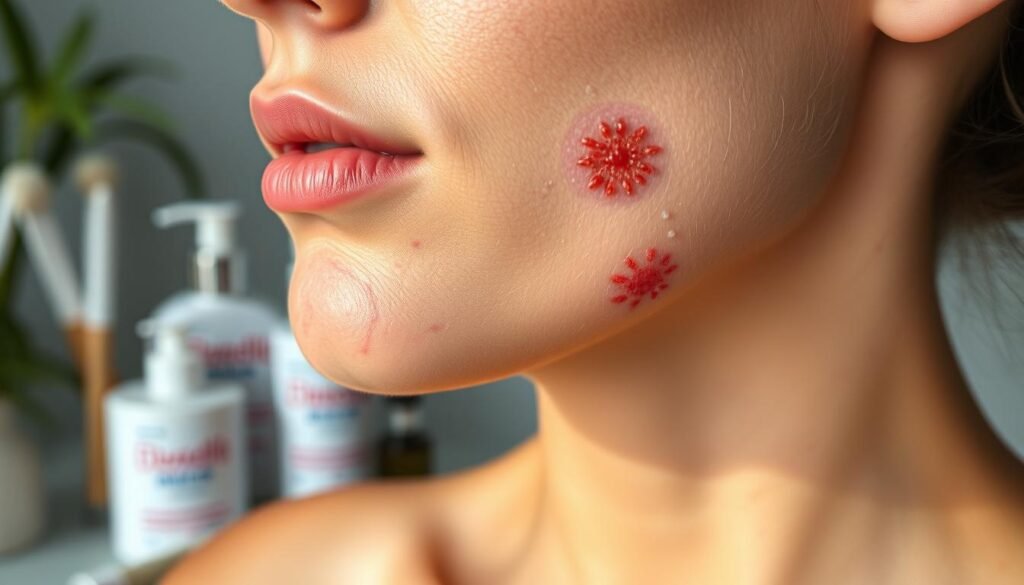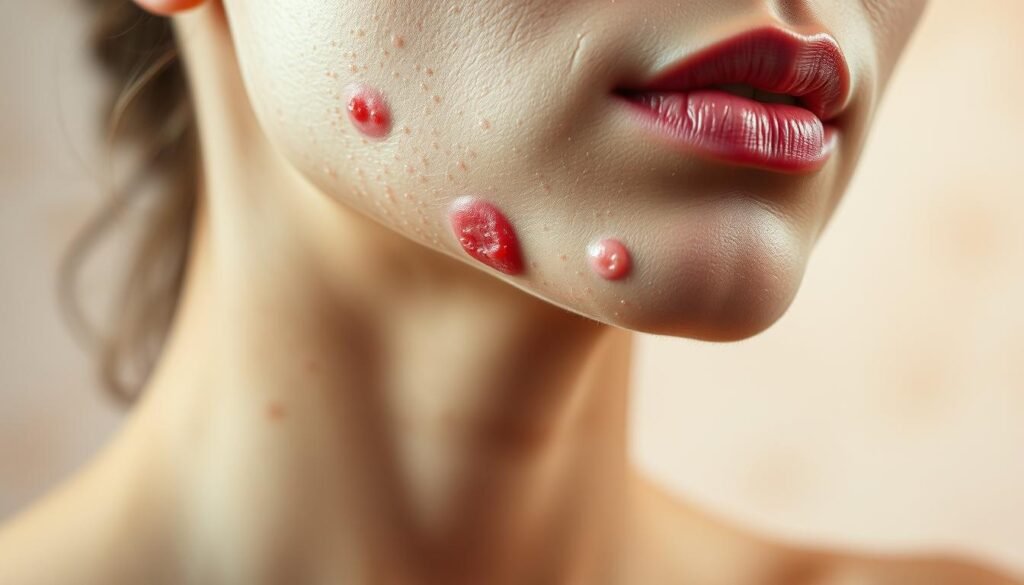Did you know that adults often get acne on their jawline and chin? This can really affect how people feel about themselves and their social life. Jawline acne is linked to changes in hormones, especially for women. It can happen during menstruation, pregnancy, or when changing birth control pills.
Hormonal imbalances can cause deep, painful acne cysts in this area. In this article, we will look at why jawline acne happens and how to deal with it. Knowing the reasons behind it is key to managing and treating this skin problem effectively.
Key Takeaways
- Jawline acne is more prevalent during hormonal changes, particularly in women.
- Common causes include hormonal imbalances, certain cosmetic products, and friction from sports equipment.
- Understanding effective treatments can lead to better management of acne vulgaris.
- Consultation with healthcare providers is essential for personalized treatment plans.
- Maintaining a proper skincare routine can significantly help in prevention and treatment.
Understanding Jawline Acne
Jawline acne has specific traits and reasons behind its occurrence. It usually looks like red, swollen pimples, whiteheads, or deep acne on the lower face. This area includes the jawline and chin. Women tend to get jawline acne more than men, often because of hormonal changes that boost oil production.
Some women see more acne during their menstrual cycles due to shifting hormones. This issue can also come with other skin problems, like PCOS, causing long-lasting acne. For men, acne might pop up after shaving. This happens when bacteria gets into the skin, clogging pores and causing more pimples.
Different types of acne can show up along the jawline, such as:
- Pimples that often go away after a few days.
- Acne that’s tougher to get rid of, sometimes lasting weeks.
It’s important to have a good plan for treating and preventing jawline acne. Keeping up a regular skin care routine, picking the right products, and not touching your face can help a lot. For hard-to-treat acne, experts may suggest treatments like benzoyl peroxide, salicylic acid, or retinoids.
Understanding the link between different kinds of acne and skin issues is key for handling them well. Looking beyond creams and washes, knowing how things like diet and hormones play a role is essential. Getting advice from a skin expert for custom treatments can help your skin look better.
Common Causes of Jawline Acne
Knowing what causes jawline acne is key to handling it well. There are many reasons why acne might appear in this area. Let’s explore these causes.
Hormonal Imbalances
Hormones play a big part in jawline acne. Changes during menstruation, pregnancy, and menopause can make skin oilier. This oil can block pores and cause acne. Also, too much vitamin B12 might disrupt hormones, leading to acne here. Hormonal imbalances often lead to deep, hard-to-treat pimples like cysts.
Cosmetic Products
What you put on your skin matters for acne. Some moisturizers, makeup, and hair products have heavy oils that block pores. Using products labeled ‘non-comedogenic’ can lower the risk of acne on the jawline. Sometimes, the makeup and skincare items we use contribute to ongoing acne.
Sports Equipment and Friction
Sporting gear can also cause acne through friction. Gear like helmets and chin straps trap heat and sweat. This creates a perfect environment for acne, known as acne mechanica. The rubbing from this equipment can make acne worse.

Jawline Acne: Causes and Treatment
Jawline acne is often linked to certain habits and conditions. Knowing what causes it can help manage it better. Two key factors are acne mechanica and the effects of stress and eating habits.
Acne Mechanica Explained
Acne mechanica comes from skin friction and irritation. This can happen with tight clothes or sports gear that traps sweat. These things can block pores and cause acne on the jawline. Constant rubbing and warmth in these areas increase oil on the skin. This makes acne more likely to happen.
Impact of Stress and Diet
Stress plays a big role in skin health. High stress makes more cortisol, which ups oil production and acne. What you eat matters too. Foods high in dairy, sugar, and refined carbs can mess with hormones. This can make insulin levels spike and make acne worse. But changing what you eat can help make your skin clearer.

| Factor | Effect on Acne |
|---|---|
| Friction (Acne Mechanica) | Causes irritation that leads to breakouts |
| Stress | Increases oil production through cortisol |
| Dietary Factors | High sugar and dairy can worsen acne |
Knowing about acne mechanica, eating habits, and stress influence is key. It helps people take action to better their skin and lessen jawline acne.
Identifying Symptoms of Jawline Acne
It’s crucial to know the symptoms of jawline acne for early help. Key signs include:
- Painful and inflamed pimples range from mild to severe tenderness.
- Cystic breakouts feel deep and may cause discomfort.
- Whiteheads and blackheads appear from clogged pores, showing different acne types.
- Skin inflammation results in irritation and possible scarring if ignored.
Jawline acne shows up differently in each person. This is especially true for individuals with darker skin, who might see more scarring or tone changes.
Hormones, like those during menstruation, significantly impact these symptoms. Spotting these signs early can lead to better treatment of jawline acne.

Effective Treatments for Jawline Acne
Dealing with jawline acne means using different treatments that fit your needs. You have many options, from things you can buy without a prescription to drugs a doctor gives you. Everyone facing this issue has many choices.
Topical Treatments
First, people often try creams and gels to fight acne. These products might contain benzoyl peroxide or salicylic acid. They work by cleaning out pores and lowering redness. Using them regularly helps keep skin clear and stops new acne.
Oral Medications
If acne is severe, doctors might suggest pills. They might give antibiotics or hormone treatments like birth control pills or isotretinoin. These medicines go after the deeper causes of stubborn acne.
Professional Treatments
Sometimes, at-home care isn’t enough. Then, experts like dermatologists can do treatments like chemical peels, light therapy, and shots to fight severe acne. These stronger treatments can make a big difference in how your skin looks and feels.
Knowing your options for treating acne helps you find the right solution for your skin issues. If you’re eager to learn more about acne and how to deal with it, check out this great resource.
| Treatment Type | Description | Common Ingredients |
|---|---|---|
| Topical Treatments | Over-the-counter solutions for mild to moderate acne | Benzoyl peroxide, salicylic acid |
| Oral Medications | Prescription options for moderate to severe acne | Antibiotics, isotretinoin, birth control pills |
| Professional Treatments | Interventional therapies for stubborn acne | Chemical peels, laser therapy, corticosteroid injections |
Building a Skincare Routine for Acne-Prone Skin
Creating an effective skincare plan is key for managing jawline acne. The right products and practices can really improve your skin. Start with a gentle cleanser, like Neutrogena’s Fragrance-Free Ultra Gentle Foaming Daily Cleanser or CeraVe’s Acne Foaming Cream Cleanser.
Choosing non-comedogenic products is crucial in acne care. They don’t clog pores, which helps to stop breakouts. Moisturize with products that won’t clog pores and are packed with hyaluronic acid, glycerin, and ceramides. Try Eucerin Face Immersive Hydration Night Cream or Cetaphil Derma Control Oil Absorbing Moisturizer SPF 30.
Exfoliation can help keep pores clear and reduce acne. Look for products with salicylic acid. They help to clear pores and ease inflammation. Another good choice is Adapalene, a retinoid that you can get without a prescription at 0.1% concentration.
Adding active ingredients, like niacinamide for oil control or alpha hydroxy acids for skin renewal, makes a big difference. It’s important to keep your skin hydrated while fighting acne for the best health.
Lifestyle Changes to Prevent Jawline Acne
Stopping jawline acne means making wise changes in your daily life. A diet full of fruits, veggies, and grains is key. These foods help keep your skin clear. Drink plenty of water to make your skin strong and flexible.
Working out isn’t just good for your body but also helps you deal with stress. Stress can make your skin oily and increase acne risk. So, keeping stress low is very important.
Getting enough sleep is also crucial to fight acne. Sleep helps control stress hormones that can make acne worse. Keep your gym clothes clean and take care of your skin before and after workouts. This helps prevent acne from sweat and oils.
What you eat affects your skin’s health. Studies link high-glycemic foods like white bread and candy to acne. Eat foods full of antioxidants and proteins to support your skin.
Also, keep your cell phone and pillowcases clean to get rid of bacteria. Try not to touch your face too much. This can spread dirt and oil, causing more pimples.
Finally, sunscreen is essential. Choose an SPF of 30 or higher that’s oil-free and doesn’t clog pores. Sunscreen not only protects your skin but also stops it from getting too dry. This helps keep oil production in check, making other acne-fighting steps more effective.
- Maintain a balanced diet with plenty of fruits and vegetables
- Stay hydrated to keep skin healthy
- Engage in regular exercise to manage stress
- Get enough restorative sleep to regulate cortisol levels
- Wash workout clothing to avoid acne from sweat and oils
- Avoid high-glycemic foods for better skin health
- Clean personal items that touch the face regularly
- Use sunscreen daily to protect the skin
When to Seek Professional Help
People with ongoing or severe acne should think about getting professional help. If the store-bought treatments aren’t working, it might be time to see a dermatologist. Cystic acne can be particularly bad and may lead to scars if not treated properly.
Keep an eye out for these signs:
- Presence of cystic acne
- Acne that doesn’t get better with usual treatments
- Visible scarring
- Too much hair growth
- Menstrual cycle changes suggesting hormonal issues
A visit to a dermatologist can help create a treatment plan suited to your skin’s needs. This might involve creams, medicines to reduce inflammation, or treatments to balance hormones.
Treating severe acne is important to avoid lasting skin problems and to keep your skin healthy. A professional can offer advice on the best treatment options for your situation. This can lead to clearer, healthier skin over time.
| Signs | Recommended Action |
|---|---|
| Persistent or severe acne | Seek dermatologist consultation |
| Cystic acne | Immediate professional help |
| Visible scarring | Discuss treatment options with a specialist |
| Excessive hair growth | Evaluate hormonal causes with a dermatologist |
| Menstrual changes | Consider hormonal evaluation and treatment |
Conclusion
Managing jawline acne takes a full plan. It’s a big problem for many in the US. People should learn about what causes it. This includes hormone changes and the environment.
There are many treatments, from simple ones to professional help. These can make your skin better. Taking care of your skin every day is key. Use products with benzoyl peroxide and salicylic acid.
Changing your lifestyle helps too. Eat well and manage stress. These steps can boost any acne treatment.
Starting treatment early and tailoring it to you is important. It can make you feel better about yourself. It also helps your overall health. To learn more about acne and how to deal with it, NCBI has great information.